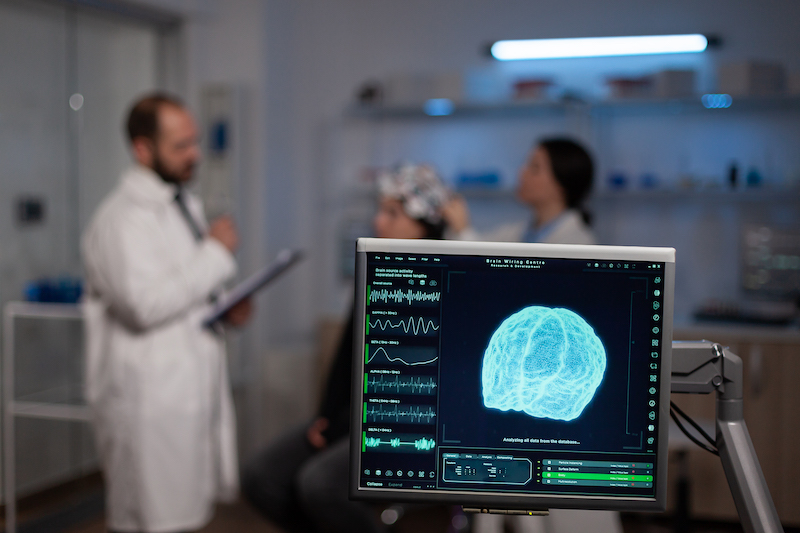Neurology is a medical specialty that deals with the diagnosis, treatment and managing disorders of the nervous system. The nervous system is a complex network that includes the brain, spinal cord, peripheral nerves, and muscles. Neurologists focus on various aspects of the nervous system, including its structure, function, electrical activity, chemical processes, and disorders that can affect its normal functioning.
Neurologist
A neurologist performs various examinations and tests to diagnose and monitor neurological conditions. Some of the examinations and tests that a neurologist may conduct include:
Neurological examination
This is a comprehensive examination that includes an assessment of brain function, sensory abilities, motor functions, reflexes, balance, coordination, and other neurological parameters. The neurologist will review the patient’s medical history and symptoms, as well as perform a physical examination.
Electroencephalography (EEG)
This is a test that records the electrical activity of the brain. EEG is used to assess brain activity, detect epileptic activity, and monitor changes in the brain.
Electromyography (EMG) and Nerve Conduction Studies
These tests are used to assess the electrical activity of muscles and the conduction of nerve signals. EMG is used for the diagnosis of muscle and nerve disorders.

Imaging Diagnostics
A neurologist may recommend imaging tests such as MRI (magnetic resonance imaging) or CT (computed tomography) brain scans to provide a more detailed visualization of the brain structure and detect possible pathological changes.
Lumbar Puncture
This is a procedure in which a sample of cerebrospinal fluid (the fluid that surrounds the brain and spinal cord) is taken for analysis. Lumbar puncture can be used for diagnosing infections, inflammations, and other neurological conditions.
These are just some of the examinations and tests that a neurologist may perform. Specific examinations and tests depend on the patient’s symptoms, condition, and the need for further diagnostics.
Diseases of the Nervous System
There are numerous diseases that can affect the nervous system. Some of the most common diseases of the nervous system include:
Multiple Sclerosis
An autoimmune disease that damages the protective covering of nerve fibers, leading to disruptions in the transmission of nerve signals.
Parkinson’s Disease
A degenerative neurological condition that leads to mobility issues, tremors, muscle stiffness, and other symptoms.
Alzheimer’s Disease
A progressive neurological condition that causes memory loss, cognitive impairment, and changes in behavior.
Stroke
A sudden interruption of blood flow to the brain, which can result in damage to brain cells and various neurological symptoms such as weakness, loss of sensation, and speech problems.
Epilepsy
A neurological disorder characterized by recurrent seizures or epileptic episodes.
Neuropathy
Damage to the peripheral nerves that can cause pain, tingling, muscle weakness, and loss of sensation.
Migraine
A chronic neurological condition characterized by intense headaches accompanied by other symptoms such as nausea, vomiting, and sensitivity to light and sound.
Neuromuscular diseases
Similar to multiple sclerosis, myasthenia gravis is an autoimmune disease that affects the communication between nerves and muscles, resulting in muscle weakness.
These are just some of the many diseases that can affect the nervous system. Each of them has its own specific symptoms, causes, and treatment methods. It is important to consult with a specialized neurologist for the diagnosis and treatment of these diseases. Neurologists employ various diagnostic methods, including neurological examination, imaging diagnostics (e.g., MRI or CT scans), electroencephalography (EEG), and other specific tests to assess the function of the nervous system.

Symptoms of neurological diseases
Symptoms of neurological diseases can vary depending on the type of disease and the area of the nervous system affected. However, some general symptoms that may occur in neurological diseases include:
- Headaches: Including migraines, tension headaches, or severe pain in the case of a stroke.
- Dizziness and fainting: Feeling of disorientation, loss of balance, or temporary loss of consciousness.
- Changes in mobility: Muscle weakness or paralysis, tremors, muscle twitches, or stiffness.
- Coordination problems: Difficulty maintaining balance, unsteady gait, or problems with fine motor skills.
- Sensory changes: Tingling, numbness, burning sensations, or loss of sensation in certain body parts.
- Speech and language changes: Difficulty in expression, understanding, or articulation of words.
- Memory and cognitive function changes: Problems with memory, concentration, attention, and thinking.
- Epileptic seizures: Sudden, uncontrolled muscle spasms and changes in consciousness.
- Mood and mental health changes: Depression, anxiety, personality changes, or changes in emotional state.
- Sleep problems: Insomnia, excessive sleepiness, or sleep disorders.
It is important to note that these are general symptoms and can vary depending on the specific disease and individual factors. If you experience any neurological symptoms, it is important to seek medical help and consult with a neurologist for an accurate diagnosis and appropriate treatment.
Neurologist Examination – Neurological Examination at Puls Dedinje Center
Neurologist examination typically involves several steps:
Medical history
The neurologist will talk to you about your symptoms, their duration, intensity, and any other relevant factors. They will also inquire about your medical history, previous illnesses, and treatments. If possible, it would be helpful to have a trusted person accompany you, especially if you have symptoms of dizziness, epilepsy, or any form of dementia.
Physical examination
The neurologist will perform a detailed physical examination to assess your neurological condition. This may include testing muscle strength, reflexes, coordination, balance, and sensory function. They will also examine your eyes, hearing, speech, and other relevant aspects.
Additional tests
Based on the medical history and physical examination, the neurologist may recommend additional tests to confirm the diagnosis. These may include laboratory tests, such as blood or urine analysis, electroencephalography (EEG) to record the electrical activity of the brain, magnetic resonance imaging (MRI) or computed tomography CT scan for a more detailed examination of brain structures, or other specific tests related to your symptoms.
Interpretation of results
After conducting all necessary tests, the neurologist will analyze the results and interpret them in the context of your health condition. Based on this, they will make a diagnosis and discuss treatment options and further steps with you.
It is important to note that each neurologist examination will be tailored to your specific symptoms and needs. These steps may vary depending on the individual case and diagnostic setting. The order and extent of the examination may vary, but the neurologist will work towards achieving an accurate diagnosis and providing appropriate treatment or referring you for further specialist evaluation if needed.
Neurological tests commonly used to assess dementia include:
Mental status examination
This examination assesses cognitive functions, including memory, attention, language, visual abilities, executive functions, and abstract thinking. The neurologist will ask questions, give tasks, or use standardized tests to evaluate your cognitive function.
The neurologist will evaluate your neurological functions, such as motor abilities, balance, coordination, reflexes, and sensory functions. This may include testing muscle strength, coordination of movements, and sensitivity to touch.
Screening tests for dementia
There are standardized tests used for screening dementia, such as the Mini-Mental State Examination (MMSE) or the Montreal Cognitive Assessment (MoCA). These tests can help detect cognitive impairment and assess the degree of dementia.
Additional tests
Depending on the results of the previous tests, the neurologist may recommend additional tests such as brain imaging (MRI or CT scan), electroencephalography (EEG) to evaluate brain electrical activity, or blood laboratory tests to rule out other potential causes of symptoms.
It is important to note that the diagnosis of dementia is a complex process, and the neurologist will consider all available information, including symptoms, test results, and medical history, to establish an accurate diagnosis. These tests are typically used as part of a comprehensive assessment of patients exhibiting dementia symptoms.

Neurological tests used for stroke assessment include:
Screening tests for rapid assessment
These tests are often used in emergency situations to quickly assess the possibility of a stroke. The most well-known screening test for stroke is the FAST test (Face, Arms, Speech, Time). This test involves checking for symptoms such as facial asymmetry, weakness or loss of strength in the arms, and speech disturbances. The time of symptom onset is also evaluated, as a prompt reaction can be vital for stroke treatment.
The neurologist will evaluate the patient’s neurological functions, including motor abilities, balance, coordination, sensory functions, and reflexes. This may involve testing muscle strength, coordination of movements, assessing touch sensitivity, and other neurological tests.
Brain imaging
Brain imaging techniques such as magnetic resonance imaging (MRI) or computed tomography (CT) may be used to visualize brain tissue and identify potential damage caused by a stroke. These methods can help confirm the diagnosis and determine the type and extent of damage.
Blood tests
In some cases, blood (laboratory) tests may be used to assess the levels of certain markers that can indicate a stroke, such as markers of brain damage or coagulation factors.
It is important to note that these tests are just part of a comprehensive stroke assessment. Quick reaction and emergency medical intervention are crucial for successful stroke treatment. In emergency situations, the patient will be referred to emergency medical assistance to initiate appropriate treatment as soon as possible.
Neurological tests used for the assessment of multiple sclerosis (MS) include:
The neurologist will evaluate various neurological functions of the patient to identify characteristic signs and symptoms of multiple sclerosis. This may involve assessing coordination of movements, balance, muscle strength, sensitivity, reflexes, and other neurological functions.
Magnetic resonance imaging (MRI) of the brain and spinal cord
MRI imaging is commonly used to visualize lesions or damage in the brain and spinal cord, which are characteristic of multiple sclerosis. This can aid in the diagnosis of the disease and monitoring its progression over time.
Electroencephalography (EEG)
EEG is a test that records the electrical activity of the brain using electrodes placed on the scalp. This test can be used to rule out other neurological disorders that may mimic the symptoms of multiple sclerosis.
Lumbar puncture (also known as a spinal tap)
This procedure involves the collection of cerebrospinal fluid (CSF) sample from the spinal canal. Lumbar puncture can be used to detect the presence of characteristic disease markers in the CSF, such as specific antibodies and oligoclonal bands.
Visual Evoked Potentials (VEP)
VEP test is used to assess visual function. Visual stimuli are presented to the patient, and the electrical activity of the brain is measured to evaluate the speed and strength of the brain’s response to visual stimuli.
These tests are typically used in combination with a detailed patient history and other diagnostic methods to diagnose multiple sclerosis and assess the patient’s condition. Neurologists use these tests to gain a comprehensive understanding of the neurological change’s characteristic for this disease.


